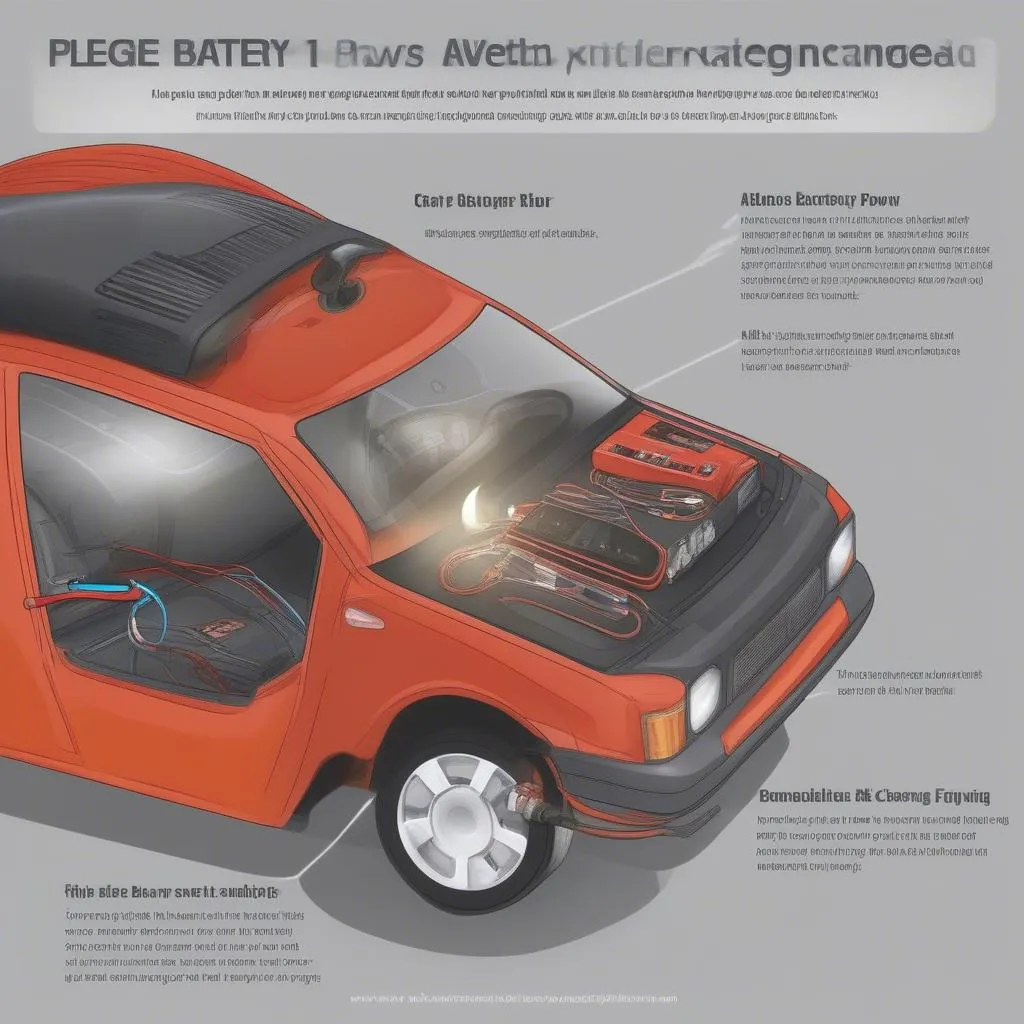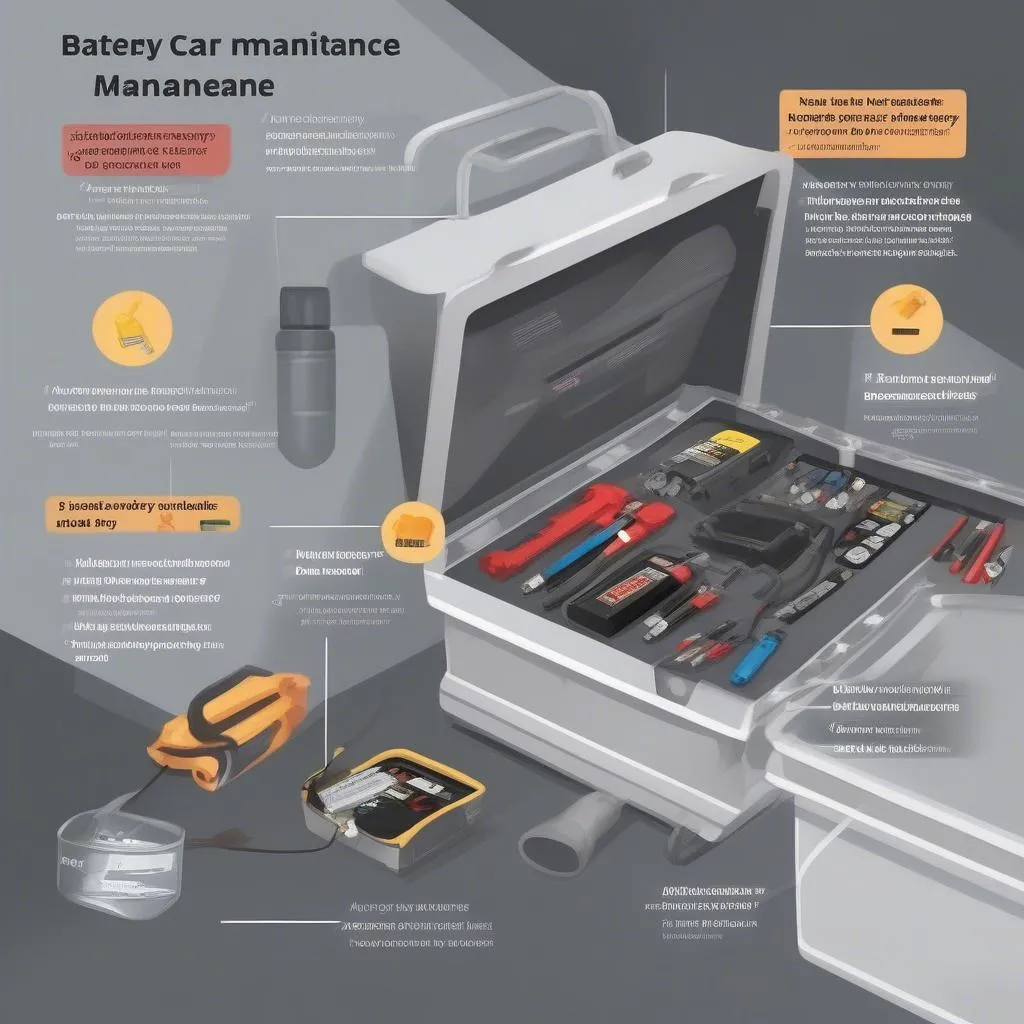Have you ever found yourself stranded on the side of the road, your car’s engine refusing to turn over? It’s a frustrating experience, and more often than not, the culprit is a dead car battery. But what exactly is a Car Power Battery, and how does it work?
What is a Car Power Battery?
A car power battery, or simply car battery, is a crucial component in any gasoline-powered car. Its primary function is to provide the initial electrical energy needed to start the engine, powering the starter motor to crank the engine. Once the engine is running, the battery is recharged by the alternator.
The Importance of a Healthy Car Battery
A healthy car battery is vital for your car’s overall functionality. Here’s why:
- Starting the engine: This is the battery’s most obvious role. Without sufficient power, the starter motor won’t engage, leaving you stranded.
- Providing electricity: The car battery powers the car’s electrical systems like lights, radio, and air conditioning.
- Ensuring electrical stability: The battery acts as a buffer to prevent voltage fluctuations, ensuring smooth and consistent power delivery.
 Car battery starting an engine
Car battery starting an engine
What to Consider When Choosing a Car Battery
Choosing the right car battery for your vehicle is essential. Here are some key factors to consider:
- Cold Cranking Amps (CCA): CCA is a measure of the battery’s ability to start the engine in cold weather. Higher CCA ratings are needed in colder climates.
- Reserve Capacity (RC): RC measures the battery’s ability to provide power to the car’s electrical systems if the alternator fails. Higher RC ratings mean longer backup power.
- Battery size: The battery should fit physically in the battery tray and have the correct terminal locations.
- Battery type: Different battery types (lead-acid, AGM, lithium-ion) have different advantages and disadvantages.
How to Maintain Your Car Battery
To ensure a long life for your car battery, it’s crucial to perform routine maintenance:
- Clean the battery terminals: Corrosion can impede current flow, reducing battery performance. Cleaning the terminals with a wire brush and baking soda solution helps maintain a good connection.
- Check the battery fluid level: For lead-acid batteries, check the fluid levels regularly and top them off with distilled water as needed.
- Avoid excessive drain: Leaving the car’s lights on or using electrical accessories with the engine off can drain the battery.
- Regular battery testing: Take your car to a mechanic for regular battery testing to ensure it’s functioning properly.
 Car battery maintenance checklist
Car battery maintenance checklist
Common Car Battery Problems
Car batteries can encounter various problems, leading to poor performance or complete failure. Here are some common issues:
- Battery terminal corrosion: Corrosion can cause a poor connection, reducing the battery’s ability to provide power.
- Sulfation: Sulfate crystals form on battery plates due to prolonged undercharging, hindering the flow of electricity.
- Battery swelling: Internal battery damage or overcharging can cause swelling, indicating a potential safety hazard.
Troubleshooting Car Battery Issues
If you suspect your car battery is the culprit for a starting problem, follow these troubleshooting steps:
- Check battery terminal connections: Make sure the cables are securely connected and free from corrosion.
- Jump-start the car: Try jump-starting the car using a good battery. If it starts successfully, it indicates a weak battery.
- Use a battery tester: A battery tester will reveal the battery’s voltage and capacity, providing insights into its health.
What to Do If Your Car Battery Fails
If your car battery has failed completely, you have several options:
- Replace the battery: This is the most straightforward solution. Purchase a new battery compatible with your vehicle.
- Jump-start the car: If you have a good battery and cables, you can try jump-starting the car to get it to a mechanic or to a place where you can replace the battery.
- Call a tow truck: If you can’t jump-start the car, call a tow truck to take it to a repair shop.
Where to Buy a New Car Battery
You can purchase a new car battery from various retailers:
- Auto parts stores: Stores like AutoZone, Advance Auto Parts, and O’Reilly Auto Parts offer a wide selection of car batteries.
- Online retailers: Amazon, Walmart, and other online retailers offer convenient online purchasing options.
- Car dealerships: Car dealerships also sell batteries, though prices may be higher.
FAQs About Car Batteries
Q: How long does a car battery last?
A: The lifespan of a car battery varies depending on factors like driving habits, climate, and battery maintenance. On average, a car battery can last anywhere from 3 to 5 years.
Q: How do I know if my car battery needs to be replaced?
A: Several signs indicate a failing battery, including slow cranking, dimming headlights, clicking noises when trying to start the car, and a warning light on the dashboard.
Q: Can I use a different type of battery in my car?
A: Not necessarily. Using the wrong type of battery can affect your car’s performance and potentially damage the electrical system.
Q: Can I replace the car battery myself?
A: You can replace the car battery yourself, but it’s crucial to follow safety precautions and ensure you have the correct tools and knowledge. If you’re unsure, consult a mechanic for guidance.
Related Articles
- Econo Power Car Battery
- LiPo Battery for Car
- Duracell Car Battery
- Diehard vs Duralast Car Battery
- LiPo Battery for RC Car
Do you need help diagnosing your car battery issues? Contact us today!
We have a team of experts who can help you with all your automotive needs.
Whatsapp: +84767531508